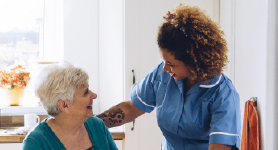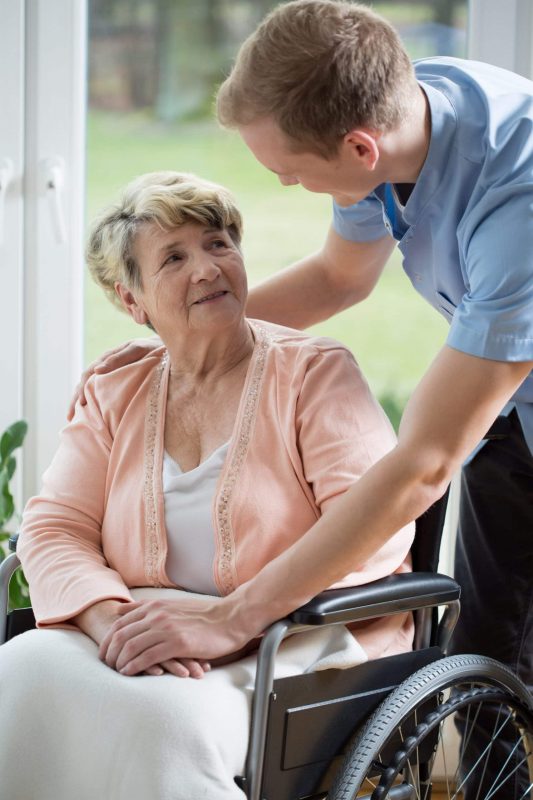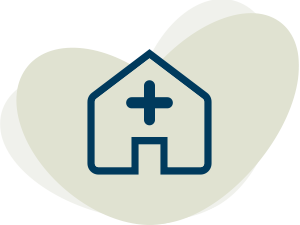How many types of widely recognised dementia are there?
Research into dementia is thankfully progressing all the time. This has led to the classification of over 400 types of dementia, the most common of which are Alzheimer’s and vascular dementia.
Dementia is most common in people aged 65 and over but it can occur at a younger age. Sadly, most dementias are progressive and lead to a deterioration of functionality over time. However, there’s lots that can be done to help people live well at home.
What is dementia care at home?
Dementia care at home is where a person living with dementia is supported to live independently at home. It could be that they are supported with one or more of the following:
• Personal care (e.g. washing, toileting, changing and self-care)
• Companion care (running errands and socialising)
• Medication support (including administering where required)
• Emotional and behavioural help
• Home help (including domestic chores)
• Night service
• Respite (for family members)
In Nayland Care’s view, dementia care at home should encourage independence with a care plan that focuses on what the person is able to do rather than what they cannot. The focus is on both the physical and mental aspects of living with dementia.
A person’s dementia care plan will outline their care needs and the support they can expect to receive. What is included with the dementia care plan depends on an individual’s care needs. This is important with all care planning, but especially complex care. Regular reviews are held to make sure that care plans are meeting the needs of both the client and their family.
What are the benefits of dementia care at home?
Remaining comfortable and independent at home can have a positive impact when living with dementia. Even if a person’s memory is affected, the home environment can still promote a sense of familiarity and comfort.
A home carer expertly trained in dementia care will know how to build on a person’s strengths and abilities. Equally, they understand where higher levels of support are required.
Nayland Care’s specialist dementia homecare planning tool is designed to accurately assess a person’s needs. This is so that they have the best possible outcome from being supported at home.
There are benefits to family members too as it can be quite exhausting caring for someone with dementia. Care at home can offer much needed respite as well as friendly, expert advice on what else could be introduced to support their loved one.
How do you care for someone with dementia?
The answer is always, with compassion. To support someone living with dementia to live ‘well’, their individual care at home plan needs to be person-centred.
This means that the support they receive addresses all their care needs and not just the medical. This is why Nayland Care’s carers receive in-depth training on dementia care, including theoretical and care-based training. After all, dementia can take many different forms and our carers need to be aware of the complexities of the condition to support a broad range of needs.
Our carers also need to be understanding of the wider impact of a person’s dementia on close family members.
What do you do when a dementia patient refuses care?
Sadly, this can and does happen given the nature of dementia and how it can affect an individual’s behaviour and emotions. This is why our carers are expertly trained in how to defuse a situation and explain to an individual why having care is important. A lot of emphasis is placed on getting the approach right by:
• Giving clear explanations and repeating where necessary
• Building a close trusted relationship, showing the individual they are always valued
• Ensuring we go at a pace they are comfortable with
We are aware that sometimes, a person may also refuse help because they want to remain independent. That’s why we constantly keep our care plans under review to ensure that a person can remain as independent as possible.
What is Dementia Care Mapping?
Dementia Care Mapping (DCM) involves healthcare professionals staff stepping into the shoes of the person living with dementia so that they can create and deliver a person-cantered care plan.
A professional carrying out dementia care mapping will closely observe the behaviours of the person living with dementia. The assessing professional charts a person’s behaviour against different codes and categories. The process is usually carried out over multiple sessions and several different visits by a qualified individual.
By picking up even the smallest of things that cause a person distress or unhappiness, DCM ensures that care plans, including dementia home care plans, are individualised and person-centred.
Essentially, DCM recognises that everyone living with dementia is uniquely individual and so too are their care needs, which is something Nayland Care strongly believes in.
How does dementia care at home promote independence?
Dementia care at home promotes independence in several ways. If an individual healthcare at home plan is enablement-focused, it will encourage a person living with dementia to do things for themselves so that they do not become unnecessarily dependent on others.
There are many positive benefits to creating dementia care at home plans that seek to promote independent living and enablement. For a start, people who are less dependent are far more likely to participate in daily self-care.
Specially trained carers break down bigger tasks into smaller, more manageable activities. This gives back control and a sense of independence to the person being cared for.
Having dementia care at home can also help establish a good routine and enable a person to live independently. For example, regular meals, bathing, sleeping and socialising are known to reduce anxiety and increase a person’s sense of security.
Regular dementia care at home can also promote exercise to maintain good muscle strength and flexibility to keep doing activities independently. Building exercise into an individual healthcare plan can also reduce the likelihood of a person developing other conditions linked to inactivity.
Many activities may be enjoyed together, by both carer and the person being cared for, to give a sense of companionship. For example, someone may not be able to prepare meals themself. However, with the help of a carer, they could batch-cook meals for several days and really enjoy socialising at the same time. It really depends on the person, what type of dementia they have (there are over 400 different types), how they are individually affected and what support they already have in place.
How does dementia affect daily life?
When people think about dementia care at home, the first thing they tend to think about is memory loss. While this is commonly seen with people living with dementia, it is not the only symptom. Dementia itself is not a specific disease – rather, it’s a medical term used to describe a set of symptoms affecting a person’s ability to make decisions, think, interact and remember.
There are over 400 different types of dementia, and Alzheimer’s disease is the most common. Alzheimer's disease affects a person’s memory, thinking and behaviour. Symptoms can either progress over several years or develop quite quickly. Although most people living with Alzheimer’s are older, it can affect any age group.
There’s a common misconception that dementia is part of normal aging, but it is not. It’s not simply a case of forgetting things, although this can be an early sign.
Dementia can present with many different symptoms, including (but not limited to):
• Reasoning and judgement issues (out of character risk-taking)
• Poor communication
• Memory and forgetfulness (forgetting the names of close family members and everyday objects, for example)
• Inattentiveness
• Big difference in visual perception (beyond what would be expected)
• Getting lost
• Inability to complete tasks
• Irrational emotional responses to situations
Dementia can sometimes be linked to other conditions, as is often the case with vascular dementia, which accounts for 10% of cases. Vascular dementia is often characterised by bleeds on the brain (strokes) and can be very challenging to live with. However, with a personal dementia care at home healthcare plan, it is possible to live a meaningful life at home by concentrating on what a person can do rather than what they cannot.
Some people have more issues with movement and balance, as is the case with Lewy body dementia, which can create stiffness or trembling. Depending on the impact of the condition, they may also have trouble sleeping and feel confused.
Frontal-temporal dementia affects the parts of the brain that control a person’s personality and behaviour. People with this type of dementia may say inappropriate things or behave out of sorts and may have trouble finding the words to communicate.
Quite often, more than one type of dementia is diagnosed, especially in older people, and this is clinically referred to as mixed dementia.
Everyone experiences dementia as an individual, and with 400 plus different types, it’s important that dementia care at home is person-centred.
Family members may become worried about how a loved one might behave or react to visitors or social situations. However, at Nayland Care, our staff are trained to know that this is part of dementia, and the person truly cannot help it. Our staff receive intense experiential training, so they understand dementia from the person’s perspective, which enables them to deliver dementia care at home with empathy.
It’s our belief that with the right personal care plan, a person can live well with dementia and be supported to live safely and as independently as possible.












